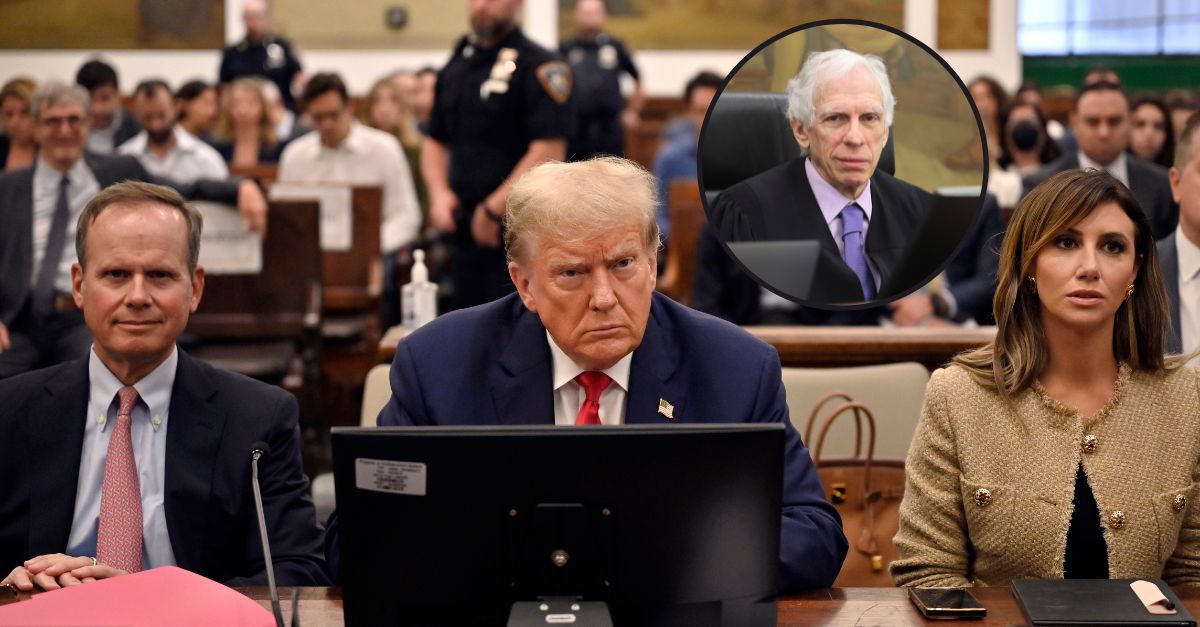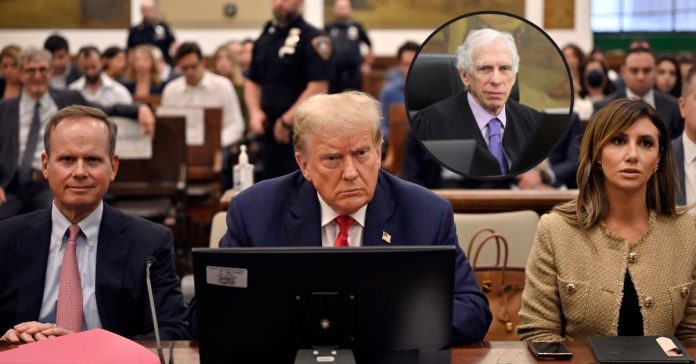
Former President Donald Trump sits between his lawyers Christopher Kise, left, and Alina Habba during his civil fraud trial on Oct. 4, 2023. (Angela Weiss/Pool Photo via AP). Inset: Judge Arthur Engoron (Spencer Platt/Pool Photo via AP)
Former President Donald Trump’s attempt to sue Manhattan Supreme Court Justice Arthur Engoron over the New York civil fraud trial judge’s gag orders was “not permitted,” the appellate division concluded in a four-page decision and order Thursday.
“Petition pursuant to CPLR article 78 to annul and vacate four orders of Supreme Court, New York County (Arthur F. Engoron, J.) […] unanimously dismissed, without costs, as seeking review of orders not reviewable under article 78,” the Supreme Court of New York’s First Appellate Department said.
Trump filed the petition under Article 78 against Engoron back in mid-November, asking the appellate division to agree that the jurist’s gag orders and fines against the former president and his lawyers were an abuse of authority and unconstitutional.
While lawyers for the state and the judge argued all along that the Article 78 petition should go nowhere, Trump’s legal team went so far as to request leave to seek immediate review of the gags at the New York Court of Appeals, the Empire State’s highest court.
After that request for leave was rebuffed, Trump declined to testify at the trial on Dec. 11.
Now, just three days later and as the trial proceedings break until January, the appellate division said Trump’s Article 78 gambit seeking a writ of prohibition would have turned the normal appellate process upside-down if it were to be accepted.
“Permitting liberal use of this remedy would effectively achieve premature appellate review and undermine the statutory and constitutional regime governing the appellate process,” the order said. “Invoking this extraordinary remedy is only appropriate if there exists a substantial claim of an absence of jurisdiction or an act in excess of jurisdiction.”
The court explained that “the gravity of potential harm” to Trump “is small, given that the Gag Order is narrow, limited to prohibiting solely statements regarding the court’s staff” and, in any event, Engoron’s orders are “reviewable through the ordinary appellate process.”
The appellate division, therefore, said that Trump lost out:
As to the first cause of action, CPLR 7801(2) clarifies that article 78 review is not permitted in a civil or criminal action where it can be reviewed by other means, “unless it is an order summarily punishing a contempt committed in the presence of the court” (CPLR 7801[2]). The Contempt Orders here were not issued “summarily,” nor was the contempt “committed in the presence of the court.” To the extent there may have been appealable issues with respect to any of the procedures the court implemented in imposing the financial sanctions, the proper method of review would be to move to vacate the Contempt Orders, and then to take an appeal from the denial of those motions.
New York law says that an Article 78 petition “shall not be used to challenge a determination: 1. which is not final or can be adequately reviewed by appeal to a court […] or 2. which was made in a civil action or criminal matter unless it is an order summarily punishing a contempt committed in the presence of the court.”
On Wednesday, after the state rested its case, New York Attorney General Letitia James (D) said she was looking forward to closing arguments in 2024.
“Today, after 11 weeks of trial, we rested our case against Donald Trump and the Trump Organization for years of financial fraud,” James said. “While the judge already ruled in our favor and found that Donald Trump engaged in years of significant fraud and unjustly enriched himself and his family, this trial revealed the full extent of that fraud — and the defendants’ inability to disprove it. We look forward to presenting our closing argument on January 11.”
Read the Thursday order here.
Have a tip we should know? [email protected]

